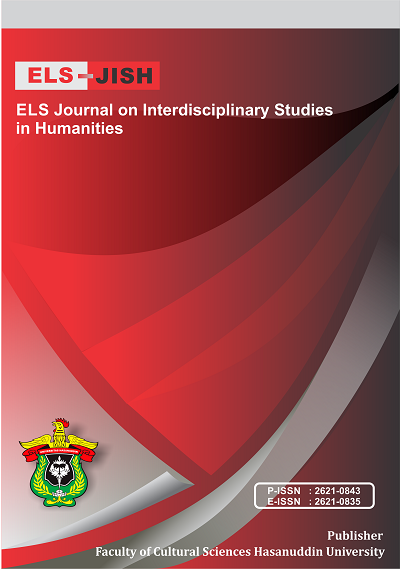The Effectiveness of the Students’ Vocabulary Handbook of English Course at Zahanain Islamic Boarding School
DOI:
https://doi.org/10.34050/elsjish.v6i1.26329Keywords:
Learning strategy, Memorization, Vocabulary developmentAbstract
This study investigated teaching strategies to develop students' vocabulary in conducting the research. This research uses the descriptive qualitative method. This study analyzed the data obtained through observation, interview, and questionnaire methods descriptively. A literature review was carried out. The findings show that interactive media in handbooks influences learning in teaching vocabulary in the Zahanain English Course. The literature study also found that interactive media greatly influenced students' motivation and involvement in learning vocabulary. Teachers are encouraged to use interactive teaching media in developing students' vocabulary. Cultural, educational background, and traditional teaching practices in Zahanain English Course are identified to be the factors that contribute to many students' heavy reliance on memorization as their sole approach to vocabulary learning. In addition to rote memorization, which has been proven useful and effective in the Zahanain English course ELT context, this paper suggests that students be presented with vocabulary learning strategies and be taught how to build vocabulary through other useful learning methods.
References
Amir P.,M., Sukmawati, Rahman, F.F., & Andini, C. (2023). Symbolic Violence and Woman’s Resistance Reflected in “Legally Blonde” Novel by Amanda Brown. Journal of Positive Psychology & Wellbeing, 7(2), 556–564.
Andini, C., Sosrohadi, S., Fairuz, F., Dalyan, M., Rahman, F. F., & Hasnia, H. (2022). The Study of Japanese Women in the Facial Treatment Advertisement: A Semiotics Perspective of Pierce’s Theory. ELS Journal on Interdisciplinary Studies in Humanities, 5(2), 337-347.
Bakhsh, S. A. (2016). Using Games as a Tool in Teaching Vocabulary to Young Learners. English language teaching, 9(7), 120-128.
Chamot, A. U. (1990). Cognitive instruction in the second language classroom: The role of learning strategies. Georgetown University Round Table on Language and Linguistics, 496-513.
Graves, M. F. (2016). The vocabulary book: Learning and instruction. Teachers College Press.
Hasnia, H., Andini, C., Tahir, M. D., Hunaeni, H., Zulfikariandi, Z., & Muslimin, M. T. (2022). The Ability of 1st Class Students of SMAN 11 Enrekang to Arrange Verbal and Nominal Sentences. ELS Journal on Interdisciplinary Studies in Humanities, 5(3), 539-550.
Hainey, T., Connolly, T. M., Boyle, E. A., Wilson, A., & Razak, A. (2016). A systematic literature review of games-based learning empirical evidence in primary education. Computers & Education, 102, 202-223.
Jin, L., & Cortazzi, M. (2011). Re-evaluating traditional approaches to second language teaching and learning. Handbook of research in second language teaching and learning, 2, 558-575.
Kumar, R., & Lightner, R. (2007). Games as an interactive classroom technique: Perceptions of corporate trainers, college instructors and students. International Journal of Teaching and Learning in Higher Education, 19(1), 53-63
Neuman, S. B., & Dwyer, J. (2009). Missing in action: Vocabulary instruction in pre‐K. The reading teacher, 62(5), 384-392.
Pho, A., & Dinscore, A. (2015). Game-based learning. Tips and trends, 1-5.
Politzer, R. L., & McGroarty, M. (1985). An exploratory study of learning behaviors and their relationship to gains in linguistic and communicative competence. TESOL quarterly, 19(1), 103-123.
Prihandoko, L. A., Tembang, Y., Marpaung, D. N., & Rahman, F. (2019). English language competence for tourism sector in supporting socio-economic development in Merauke: A Survey Study. In IOP Conference Series: Earth and Environmental Science (Vol. 343, No. 1, p. 012170). IOP Publishing.
Rahman, F., & Amir, P. (2019). Trends in Reading Literary Fiction in Print and Cyber Media by Undergraduate Students of Hasanuddin University. International Journal of Education and Practice, 7(2), 66-77.
Rahman, F. (2018). The Constraints of Foreign Learners in Reading English Literary Works: A Case Study at Hasanuddin University. Journal of Arts and Humanities, 7(2), 01-12.
Richards, J. C. & Renandya, W. A. (2002). Methodology in language teaching: An anthology of current practice. Cambridge university press.
Sugiyono, D. (2013). Metode penelitian pendidikan pendekatan kuantitatif, kualitatif dan R&D.
Weda, S., Atmowardoyo, H., Rahman, F., & Sakti, A. E. F. (2021). Linguistic aspects in intercultural communication (IC) practices at a higher education institution in Indonesia. Eroupean Language Scientific Journal, 14, 2-6.
Downloads
Published
How to Cite
Issue
Section
License
Copyright (c) 2023 Hadi Prayitno Hadi, Abd. Aziz Wahab, Zainuddin

This work is licensed under a Creative Commons Attribution-ShareAlike 4.0 International License.






